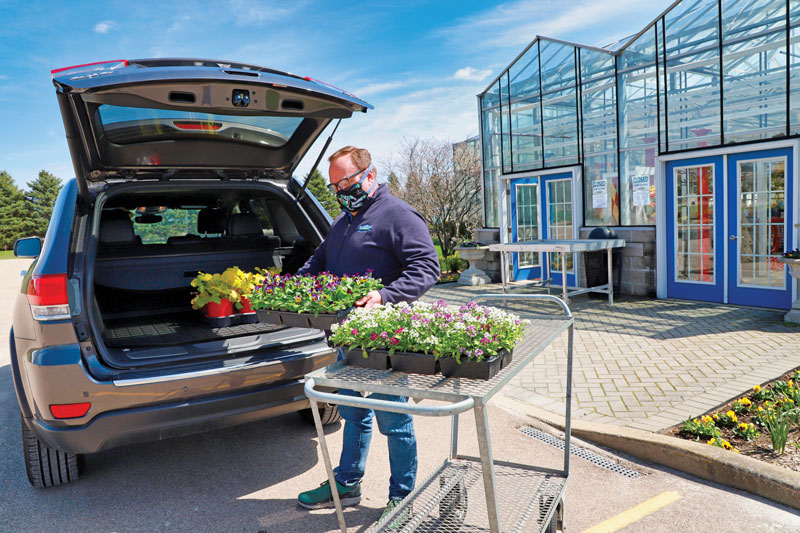5/1/2020
Retailing in a COVID-19 World
Chris Beytes

Shady Hill Gardens in rural Geneva, Illinois, has adapted to the “new normal” the same way as many grower-retailers around the country have: with a no-contact curbside pickup system. They take orders and payment over the phone; customers then drive to the nursery to pick up their plants without ever leaving the car.
In mid-April, when we visited to catch this shot, they were open for pickup Tuesday through Thursday, from 10:00 a.m. until 2:00 p.m. Co-owner Joe Heidgen (pictured) told us sales were “not down that much,” but it’s still early, he added.
“What you lose is the impulse sale,” he said, regarding customers not being able to stroll the greenhouse. Like everyone else, he hoped May would bring a loosening of the restrictions.
 Shady Hill is just one example out of thousands of how the coronavirus pandemic has impacted horticultural sales across the United States, Canada and the globe. In some regions, businesses have felt little affect. In others, they’re closed or are dumping crops due to lack of demand.
Shady Hill is just one example out of thousands of how the coronavirus pandemic has impacted horticultural sales across the United States, Canada and the globe. In some regions, businesses have felt little affect. In others, they’re closed or are dumping crops due to lack of demand.
For U.S. bedding plant growers, sales have remained strong—even record-breaking—across the Southeast where spring weather was excellent in March and April. This in spite of stay-at-home and social-distancing orders restricting traffic flow in big box and IGC retailers. Those serving landscapers (an “essential” business in most areas) are doing decently well, unless they depend upon the business of resorts or attractions, which are currently idle.
In the hard-hit Northeast, spring was just arriving at press time and stricter “essential” business rules were making retailing much harder, often limiting it to just online or curbside sales. In at least three states—Vermont, Pennsylvania and Michigan—garden centers have been deemed “non-essential,” almost killing garden sales in those states. In some others, IGCs can’t be open unless they sell food or pet products, and yet big box stores can sell from their garden centers, leaving independents crying foul to trade associations and legislators.
Growers lost much of their Easter business due to cancellations from church customers. And yet some managed to salvage even that business thanks to the kindness of customers. When word got out that Schaefer’s Greenhouse in Montgomery, Illinois, might have to dump 10,000 Easter lilies, greenhouse co-owner Mary Ann Kutnick said people started buying them—for friends, family, hospital employees, even strangers.
“All you hear is all this negative stuff in the world right now. There’s so much sadness. People are so depressed,” she told WBBM radio. “And then you see that people are willing to jump up and take everybody in their neighborhood a plant, just to give them some sunshine. It’s very moving.”
As for how spring will end up for growers on average, it’s anybody’s guess. Weather will continue to play a major factor in sales, even if sales opportunities remain restricted in many markets due to stay-at-home orders. As one Acres Online reader said, coronavirus “is just another kind of weather.” GT